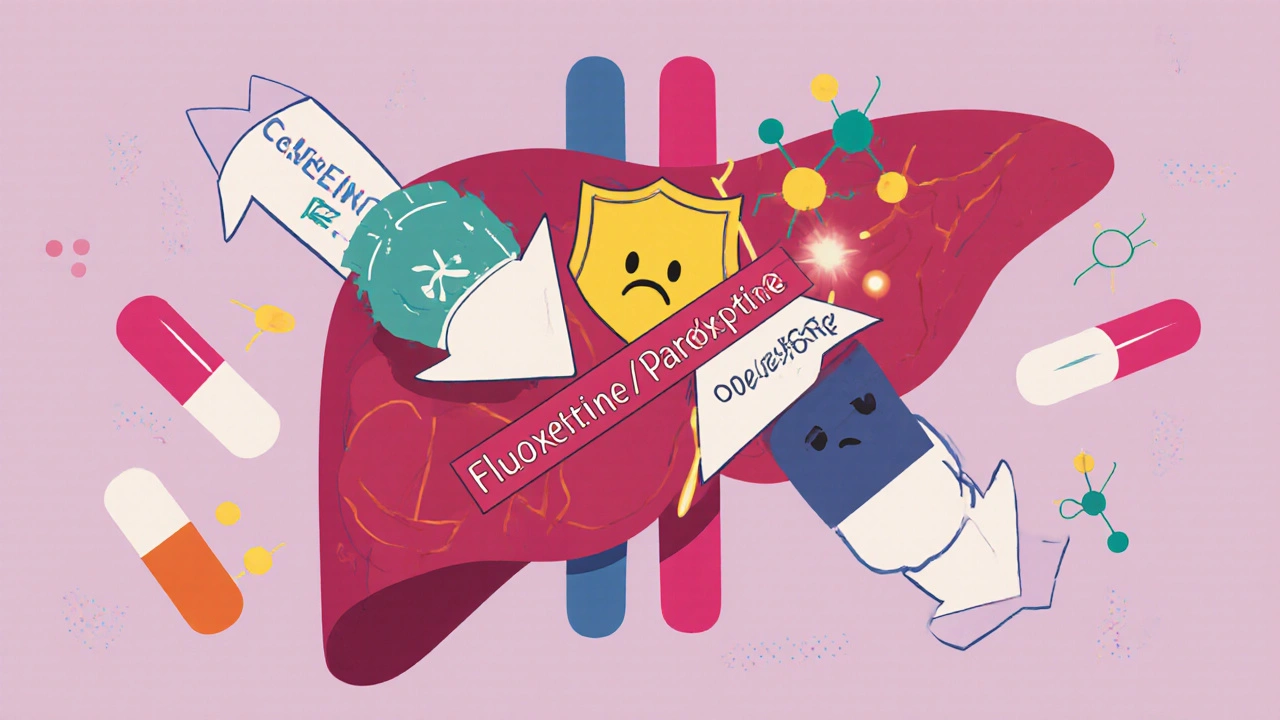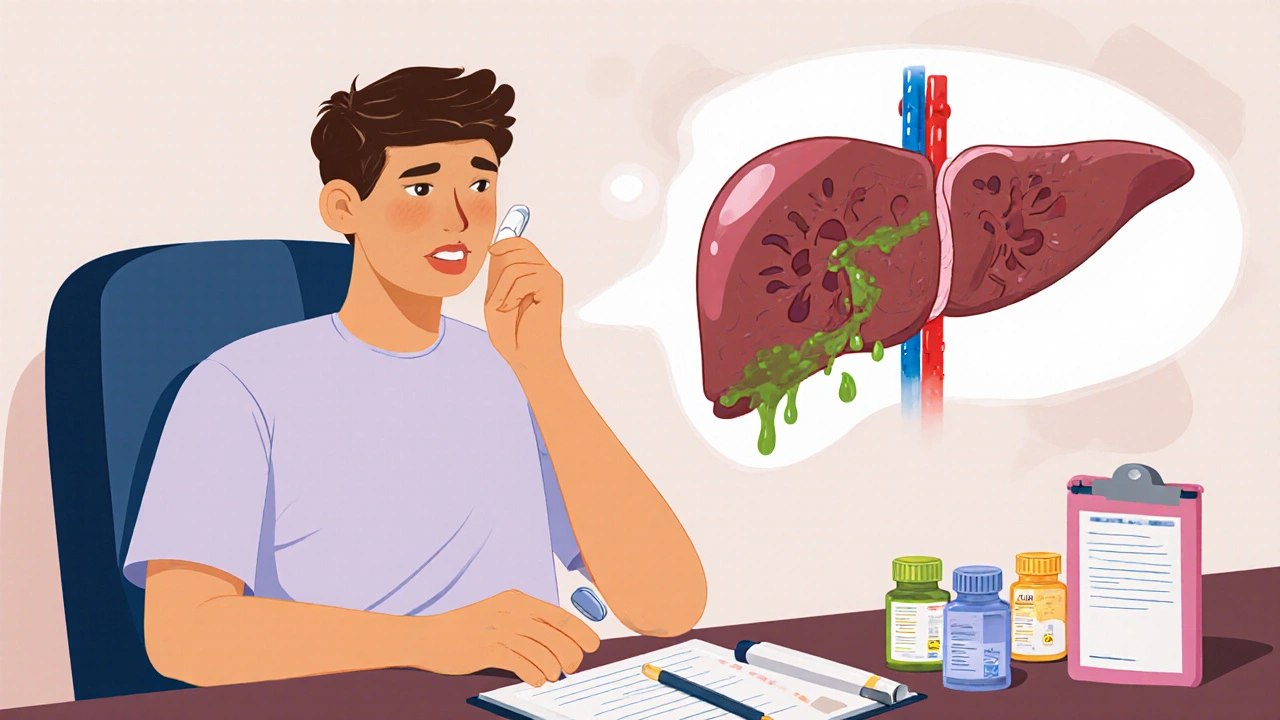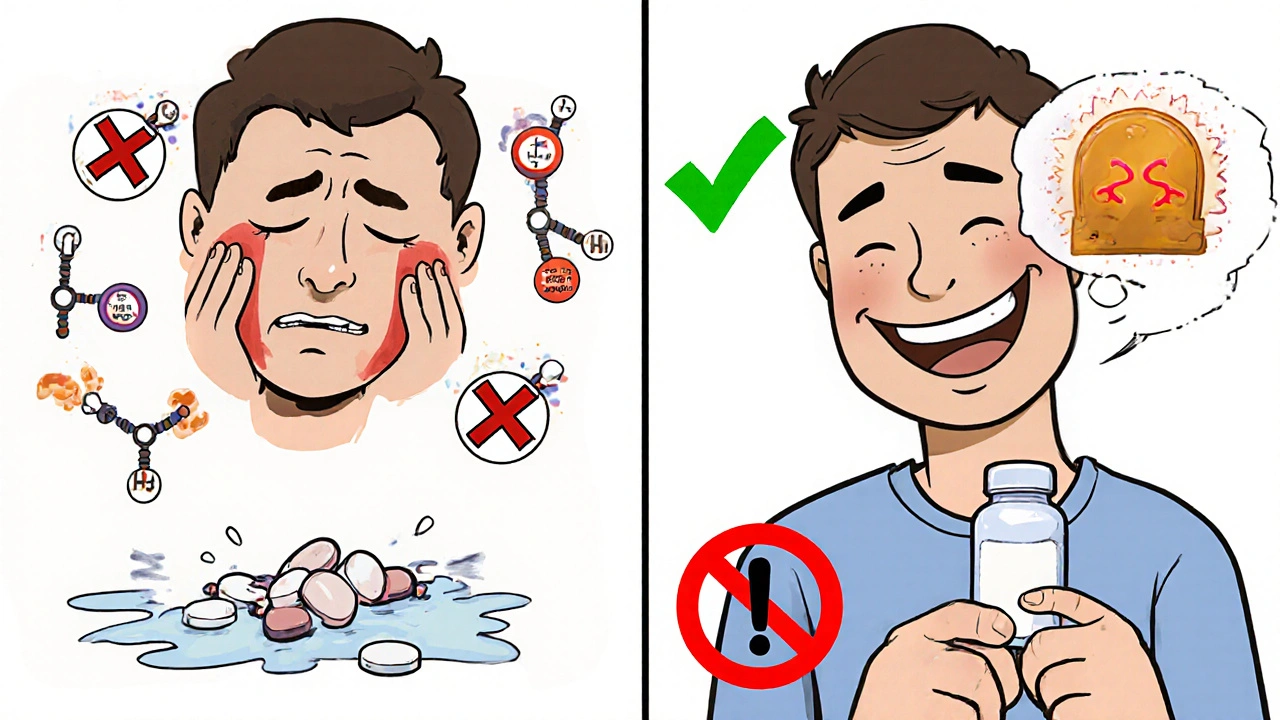Fluoxetine or Paroxetine with Codeine: Why Your Pain Relief Might Not Work
 Nov, 9 2025
Nov, 9 2025
Codeine Effectiveness Checker
Does your pain relief work?
If you're taking fluoxetine or paroxetine for depression and codeine isn't helping, this tool shows why. Your SSRI blocks the enzyme needed to convert codeine to pain-relieving morphine.
Your Results
0% pain relief expected
Based on clinical studies showing 0% CYP2D6 inhibition
What to Do Next
- 1 Talk to your doctor about alternatives like oxycodone, morphine, or hydrocodone
- 2 Consider switching to a weaker CYP2D6 inhibitor like sertraline or escitalopram
- 3 Ask about CYP2D6 genetic testing if you've had multiple medication failures
If you're taking fluoxetine or paroxetine for depression and were prescribed codeine for pain, but your pain won't go away - you're not imagining it. There's a very real, well-documented reason why codeine isn't working for you, and it has nothing to do with your pain level or tolerance. It's about your liver - specifically, an enzyme called CYP2D6.
Codeine Doesn't Work Unless Your Body Converts It
Codeine isn't the painkiller itself. It's a placeholder. Your body has to turn it into morphine before it can relieve pain. That conversion happens through an enzyme called CYP2D6. About 5 to 10% of each codeine pill gets changed into morphine this way. If your CYP2D6 enzyme isn't working, codeine is basically sugar pills.
That’s why some people feel nothing after taking codeine - not because they’re "strong" or "used to pain," but because their body can’t make morphine from it. And if you’re on fluoxetine or paroxetine, you’re probably blocking that enzyme right now.
Fluoxetine and Paroxetine Are CYP2D6 Blockers
Fluoxetine (Prozac) and paroxetine (Paxil) are both SSRIs, commonly prescribed for depression and anxiety. But they do more than boost serotonin. They’re also powerful inhibitors of CYP2D6 - one of the strongest you can get in clinical use.
Paroxetine is even more potent than fluoxetine. Studies show that at normal doses, paroxetine can block 90% or more of CYP2D6 activity. Fluoxetine isn’t far behind. When these drugs are taken with codeine, they physically get in the way of the enzyme, stopping it from doing its job. The result? Morphine levels in your blood drop by 75% to 85%. That’s not a slight reduction - it’s near-total loss of pain relief.
A 2008 study in Anesthesiology gave codeine to people taking paroxetine. Those on paroxetine had 62% less pain relief than people not taking it. Their morphine levels were 83% lower. The same thing happens with fluoxetine, though slightly less dramatically.
It’s Not Just You - Doctors See This All the Time
A 2020 survey of over 1,200 pain specialists found that nearly 8 out of 10 had treated at least one patient whose codeine completely failed because of an SSRI. Paroxetine was named in over 60% of those cases. Fluoxetine was second, cited in over 40%.
One anesthesiologist shared a case on a medical forum: a woman had surgery, got codeine for pain, and said she felt nothing. She was on paroxetine. Switched to oxycodone - pain gone in 20 minutes. No dose change. No magic. Just the right drug for her metabolism.
Pharmacists see it too. On Reddit, users report the same thing: "Codeine didn’t work while on Paxil." "Switched to oxycodone and it fixed everything." These aren’t anecdotes - they’re clinical reality.

Why Other Opioids Don’t Have This Problem
Not all opioids rely on CYP2D6. Oxycodone, hydrocodone, hydromorphone, and morphine itself work differently. They don’t need to be converted by CYP2D6 to be effective.
Oxycodone is metabolized mostly by CYP3A4 - a different enzyme that’s not blocked by fluoxetine or paroxetine. That’s why switching from codeine to oxycodone often fixes the problem overnight. The same goes for morphine - it’s already active, so no conversion is needed.
Hydrocodone is another good option. It’s converted to hydromorphone by CYP2D6, but even if that pathway is blocked, hydrocodone still works on its own. It’s not as dependent on CYP2D6 as codeine is.
What About Other Antidepressants?
If you need an antidepressant and you also need pain relief, not all SSRIs are equal. Sertraline (Zoloft) and escitalopram (Lexapro) are much weaker inhibitors of CYP2D6. Citalopram and escitalopram barely touch it at all.
If you’re on fluoxetine or paroxetine and you’re struggling with pain control, switching to one of these alternatives might solve both problems. Many psychiatrists now prefer escitalopram or sertraline for patients who need opioids - not just because of this interaction, but because they have fewer drug interactions overall.

Guidelines Say: Don’t Combine Them
The U.S. Food and Drug Administration warned about this interaction in 2007 and strengthened it in 2012. The Clinical Pharmacogenetics Implementation Consortium (CPIC) - a group of top pharmacologists and geneticists - says clearly: "Avoid codeine if you’re taking strong CYP2D6 inhibitors like fluoxetine or paroxetine."
The European Medicines Agency says the same. The American Society of Health-System Pharmacists tells pharmacists to screen for these combinations. And major drug interaction checkers like the University of Utah’s list this combo as "Severe - Use Alternative."
This isn’t a "maybe" or a "theoretical risk." It’s a proven, documented, clinically significant interaction that affects thousands of people every year.
What Should You Do?
If you’re on fluoxetine or paroxetine and codeine isn’t working:
- Don’t take more codeine. It won’t help - and it increases your risk of side effects like nausea or dizziness without giving you pain relief.
- Talk to your doctor or pharmacist about switching to an opioid that doesn’t need CYP2D6: oxycodone, morphine, or hydrocodone.
- If you need to stay on your current antidepressant, ask if switching to escitalopram or sertraline is an option.
- If you’re on a long-term pain plan, ask about CYP2D6 genetic testing. It’s not always necessary, but it can help explain why some drugs work for others and not for you.
Many hospitals now use electronic alerts to flag these interactions when a prescription is written. But if yours doesn’t, you have to be your own advocate. Bring this information to your appointment. Print it out. Show your pharmacist. It’s your right to get pain relief that actually works.
Why This Matters More Than You Think
Codeine prescriptions in the U.S. have dropped by over 40% since 2010. One of the biggest reasons? Doctors learned that too many people weren’t getting relief - and some were being exposed to unnecessary side effects. This interaction is a major driver of that decline.
It’s also why pharmacogenetic testing is growing fast. More hospitals are testing patients for CYP2D6 status before prescribing opioids. A 2022 study showed that using this testing cut codeine treatment failures by 63% in just one year.
The science is clear. The guidelines are clear. The real-world evidence is clear. If you’re on fluoxetine or paroxetine and codeine isn’t helping, it’s not your fault. It’s a known, avoidable drug interaction - and there are better, safer options.
Why doesn’t codeine work if I’m on fluoxetine or paroxetine?
Codeine needs to be converted into morphine by the CYP2D6 enzyme in your liver to relieve pain. Fluoxetine and paroxetine block this enzyme so effectively that very little - if any - morphine is made. Without morphine, codeine has almost no pain-relieving effect.
Is this interaction dangerous or just ineffective?
It’s primarily ineffective - but that can be dangerous. If you keep taking more codeine hoping it will work, you increase your risk of side effects like drowsiness, nausea, or constipation without any pain relief. You might also be tempted to use other substances to manage pain, which carries its own risks. The real danger is being undertreated for pain.
Can I just take less fluoxetine or paroxetine to avoid the interaction?
No. Even low doses of fluoxetine and paroxetine still strongly inhibit CYP2D6. Stopping or reducing your antidepressant without medical supervision can cause withdrawal symptoms or worsen your depression. The solution isn’t to adjust your antidepressant - it’s to switch your painkiller.
What are the best alternatives to codeine if I’m on an SSRI?
Oxycodone, morphine, and hydrocodone are the top choices. They don’t rely on CYP2D6 for pain relief. Oxycodone is often preferred because it’s effective, widely available, and has a predictable effect regardless of your genetics or other medications.
Should I get tested for CYP2D6 genetics?
It’s not required, but it can be helpful - especially if you’ve had multiple bad reactions to opioids. About 5-10% of people are poor metabolizers naturally, and they won’t get pain relief from codeine even without any drugs. Testing can confirm whether your issue is genetic or drug-induced. Many hospitals now offer this as part of routine care.
Are there any other medications that block CYP2D6 like fluoxetine and paroxetine?
Yes. Bupropion (Wellbutrin), quinidine, and duloxetine (Cymbalta) are also strong inhibitors. Even some antifungal and heart medications can interfere. Always check with your pharmacist before mixing any new drug with codeine.
Cris Ceceris
November 9, 2025 AT 16:14So let me get this straight - codeine is just a sugar pill if you're on Paxil? That’s wild. I’ve been on paroxetine for years and thought I was just a "high tolerance" person. No wonder my post-op pain never went away. I’ve been suffering needlessly for months. This is the first time anyone’s explained it like this.
Alyssa Salazar
November 10, 2025 AT 23:06Pharmacokinetic interaction alert: CYP2D6 inhibition by SSRIs is well-documented in the literature, but clinicians still under-prioritize it. The CPIC guidelines are crystal clear - this is a Class A contraindication. If your prescriber doesn’t know this, they’re operating on 2005-era knowledge. Time to escalate to clinical pharmacy.
Beth Banham
November 11, 2025 AT 02:00Thank you for posting this. I’ve been too scared to say anything because I thought I was just weak. Now I know it’s not me. It’s the medicine. I’m going to show this to my doctor tomorrow.
Brierly Davis
November 12, 2025 AT 02:27OMG I’ve been telling my doc this for a year 😭 I was on Prozac + codeine after my knee surgery and it did NOTHING. Switched to oxycodone and I could finally sleep. You’re not alone. Also, PS: your pharmacist is your secret weapon - they see this all the time.
Malia Blom
November 13, 2025 AT 06:05Of course it doesn’t work. You’re on an SSRI. That’s like putting a tarp over your liver and expecting it to process pain meds like a normal person. The real question is why doctors still prescribe this combo like it’s 1999. It’s not ignorance - it’s laziness. And now you’re stuck with oxycodone, which is just codeine with a better PR team.
Amber O'Sullivan
November 13, 2025 AT 16:00My mom was on Paxil after her surgery and got zero relief from codeine. They finally switched her to morphine and she cried because it worked. I wish someone had told us this before she spent weeks in pain
Alyssa Fisher
November 15, 2025 AT 03:49It’s not just fluoxetine and paroxetine - bupropion is also a potent CYP2D6 inhibitor. If you’re on Wellbutrin and codeine isn’t working, the same mechanism applies. And don’t forget quinidine, which is used for arrhythmias. Many patients don’t realize their heart medication is sabotaging their pain control. Always check drug interaction databases before combining opioids with psychotropics.
Jim Oliver
November 15, 2025 AT 22:46Wow. So you’re telling me that people who take SSRIs and then complain about codeine not working… are just bad at biology? Congrats, you’ve discovered that your body doesn’t magically override pharmacology. Next you’ll tell us gravity isn’t optional.
Brad Seymour
November 17, 2025 AT 04:59I’ve been thinking about this for a while - we treat depression like it’s just a mood thing, but it’s a whole-body chemical shift. When you block CYP2D6, you’re not just changing serotonin - you’re altering how your body processes everything from pain to caffeine to statins. It’s like your liver suddenly got a new boss who hates codeine. I wonder how many other hidden interactions we’re missing because we treat mental and physical health as separate systems.
Key Davis
November 18, 2025 AT 16:22As a clinical pharmacist with over 15 years in pain management, I can confirm this interaction is one of the most common and preventable causes of therapeutic failure in outpatient settings. The FDA’s 2012 warning was under-publicized. We now routinely screen for SSRI use before dispensing codeine. Oxycodone, morphine, and hydromorphone are first-line alternatives. Genetic testing for CYP2D6 is cost-effective in chronic pain patients with unexplained treatment failures. Advocating for yourself isn’t being difficult - it’s being informed.